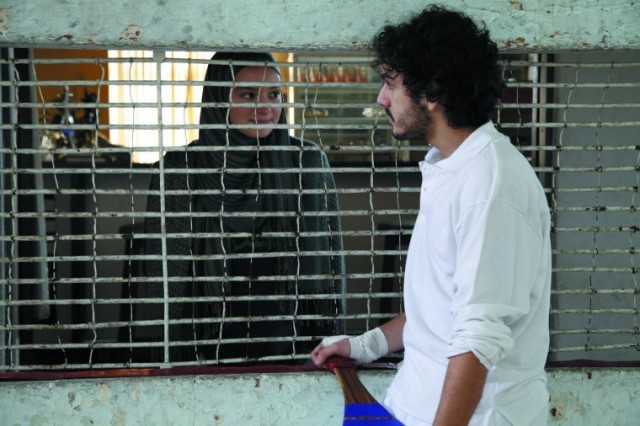 MARTINA JUNCADELLA AND MARTIN SLIPAK IN HABI, THE FOREIGNERRunning away and joining a mosque in Buenos Aires
MARTINA JUNCADELLA AND MARTIN SLIPAK IN HABI, THE FOREIGNERRunning away and joining a mosque in Buenos AiresIn Argentinian director Florencia Alvarez's first feature, Analia (Martina Juncadella), a 20-year-old from the provinces whose family runs a hairdressing salon, comes to Buenos Aires to deliver a package, and, running into a funeral in the Muslim community, feels welcomed. She's even given several of the possessions of the deceased. This somehow contributes to a decision to change identities. She phones excuses to her mother and stays in town, checking into a cheap, raucous residential hotel. She starts to "pass" as an orphaned refugee from Lebanon making up the name Habiba Rifat, Habi for short. She goes to an Arabic class at the mosque and the ever-friendly women put Muslim headdress on her. The consistently excellent Juncadella plays her character as shy and delicate, but also supple and protean, adept at deception. She fools us too, so we aren't surprised when she gets a delivery job at the Lebanese grocery -- some of these details are vague. This in turn leads her to meet Hassan (Martin Slipak), a handsome young employee who was brought from Lebanon at the age of five and feels estranged from his origins in spite of being able to read, write, and speak Arabic. Hassan is immediately drawn to Analia and she to him, and this leads to a date, which "Habi" botches. And then the deception begins to fall apart. In frustration with the date gone wrong, Analita gives in to her rowdy house-mate Margerita's invitation to come partying and the headdress is off, the hair flows and so does the beer, and the modest, pious "Habi" is drinking and dancing.
Reviewing the film at its Berlin debut for
Hollywood Reporter Stephen Dalton called it a "puzzling portrait of cultural tourism taken to extremes," alluding to how the concept of the film is more intriguing than convincing, questions posed but unanswered, the coincidences and accidents that make the Muslims believe in "Habi" too easy.. There are pluses, however, beginning with the compelling performance of Martina Juncadella, whose mobile face you can't take your eyes off of. Florencia Álvarez maintains delicacy and texture in the unfolding of the story, which stays very close to its protagonist. Details about Islam are never botched. A sense of authenticity is greatly helped by participation of what appears to be an authentic Venezuelan imam in an acting role, a Spanish speaker who can intone the Qur'an beautifully. The mesmerizing sound of Qur'anic recitation is one of the things that first attract Analia to the community, which is depicted as peaceful and welcoming. Florencia Álvarez has said that she conceived the film several years before 9/11, before Muslims were associated so much with terrorism or paranoia. There are some good random touches, such as the funny young girl at the hotel desk (noted by Dalton) who insists in speaking to everybody in English, and the frightening fight between Margarita and a boyfriend that makes Analia cringe in her little room. This "hotel" seethes with convincing seediness just through the sound track.
Motivation for Analia's risky deception isn't provided. It also remains hard to see how she could deceive people, including the sweet religious student who befriends her, Jazmín (Lucía Alfonsín), simply by claiming to be an orphan. In adopting a fake identity, language and religion are serious hurdles. Analia's sudden rejection of the pose is also unmotivated, and the manner of it ill fits with her previous reserve. Of course anything is possible, but this film doesn't make it seem quite as possible as it should. To say as Giovanni Marchini Camia of
Film Comment does that this film is "a variant of Antonioni’s thesis from
The Passenger within a much more modest scope," is almost as ridiculous as saying it's a variant of the
Bourne series, and his claim that this is an "insightful" consideration of "disorientation" at a moment of developmental confusion depends on ignoring how much the film focuses on superficial role-playing. It's nice, though, as Camia says, that Islam is shown as welcoming rather than exotic or dangerous.
Habi, la extranjera was co-produced by Walter Salles. As mentioned it debuted at the Berlinale, 12 February 2013, and it has shown at several other festivals. It was screened for this review in connection with the San Francisco International Film Festival, 25 April-May 9, 2013.





